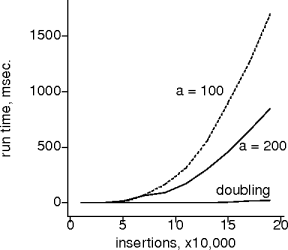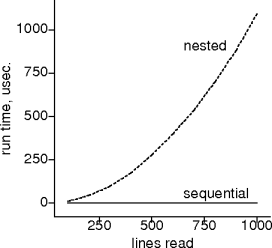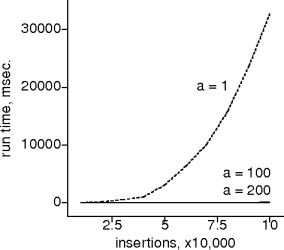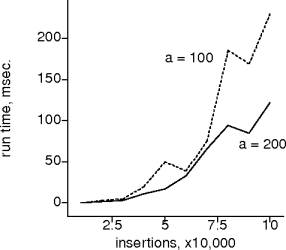Data Structures & Algorithms Lecture Notes
15 October 2009 • Performance Estimation in Practice
Outline
- String processing.
- Vector storage management.
Remember This?
StringBuilder read
while str = input.readline()
read.append(str)
for i = 0 to read.length()
if read.charAt(i) == '<'
// process tag
- Read in a string, then process all tags.
And This?
StringBuilder read
while str = input.readline()
read.append(str)
for i = 0 to read.length()
if read.charAt(i) == '<'
// process tag
read.setCharAt(i, ' ')
- Likewise: read in a string, then process all tags.
- Which program is better?
Let's Estimate!
while str = input.readline()
read.append(str)
for i = 0 to read.length()
if read.charAt(i) == '<'
// process tag
- What's the input?
- It could be lines or characters processed.
- What's the output?
- How about statements executed.
Basic Statements
- Take input to be lines processed.
- Assume n lines were read.
while str = input.readline() : O(1) read.append(str) : O(1) for i = 0 to read.length() : O(1) if read.charAt(i) == '<' : O(1) // process tag : O(1)
Compound Statements
while O(1) : O(n) O(1) for O(1) if O(1) : O(1) O(1)
- The while loop iterates O(n) times, executing O(1) + O(1) = O(1) statements on each iteration.
- The if statement executes O(1) + O(1) = O(1) statements.
Iteration Statements
O(n) for O(1) : O(1) O(1)
- The for loop iterates O(n) times.
- O(1) characters per line * O(n) lines.
Statement Sequences
O(n) O(n)
- O(n) + O(n) = max(O(n), O(n)) = O(n).
- The number of statements executed is proportional to the number of lines read.
Second Program
- Reduce the basic statements.
while str = input.readline() : O(1) read.append(str) : O(1) for i = 0 to read.length() : O(1) if read.charAt(i) == '<' : O(1) // process tag : O(1) read.setCharAt(i, ' ') : O(1)
Compound Statements
|
while O(1) O(1) for O(1) O(1)
|
while O(1) O(1) O(n)
|
- The for loop iterates in proportion to the number of lines read.
Finishing Up
while O(1) : O(n) O(n)
|
- O(n)*O(n) = O(n*n) = O(n2).
- O(n) vs. O(n2): the first program wins!
Does It?
Static Arrays vs. Dynamic Data
- Once allocated at compile time, static-array size can't be changed.
- Static arrays don't work well with dynamic amounts of data.
- Run-time size information usually isn't available at compile time.
- The result is usually too much wasted space or too little storage space.
Dynamic Arrays
- Run-time storage management resolves static storage vs. dynamic data.
- Allocate arrays at run-time.
- Size arrays exactly with run-time information.
- Replace a too-small array with a larger one.
- Allocate arrays at run-time.
Implementation
class sequenceObject data [] int next-data append(T e) if next-data ≥ data.length() Object new-data [] = new Object [data.length() + 1] for i = 0 to data.length() - 1 new-data[i] = data[i] data = new-data data[next-data++] = e
Appending Costs
- How much does an append cost?
- It depends. Does the sequence have extra space or not?
- What's the worst-case cost for append?
- Worst case, every append resizes storage.
sequence<Integer> is for i = 0 to 100 is.append(i)
- Worst case, every append resizes storage.
Worst-Case Analysis
if next-data ≥ data.length() : O(1) Object new-data [] = new Object [data.length() + 1] : O(1)?/O(n) for i = 0 to data.length() - 1 : O(1) new-data[i] = data[i] : O(1) data = new-data : O(1) data[next-data++] = e : O(1) if O(1) O(1) or O(n) for O(1) : O(n) O(1) O(1) or O(n) O(1)
Worst-Case Appending
if O(1) O(1) or O(n) O(n) O(1) or O(n) O(1)
|
if O(1) O(n) O(1)
|
O(n) O(1)
|
O(n)
|
- In the worst case, appending does work proportional to the size of the sequence.
So?
- Is doing work proportional to n so bad?
- Consider
sequence<Integer> is for i = 0 to 100 is.append(i)
How much work is going on here, worst case?
Sloppy Analysis
- In each iteration
append()does O(n) work in the worst case.for O(1) : O(n) O(n)
- Loading the sequence takes O(n2) work.
for i = 0 to n : O(1) is.append(i) : O(n)
Less Sloppy Analysis
- In each iteration
append()does work proportional toi. - The total amount of work performed by
append()is proportional to1 + 2 + ... + n = n(n + 1)/2 = O(n2)
- Loading a sequence can take O(n2) work.
for i = 0 to n is.append(i)
Better Behavior
- Can
append()have better behavior? How?- “Better” means “asymptotically less.”
- How about amortizing the amount of work done on each append?
- Reallocate and copy every t appends, rather than on every append.
Amortized Sequences
class sequenceObject data [] int next-data unsigned a = 50 append(T e) if next-data ≥ data.length() Object new-data [] = new Object [data.length() + a] for i = 0 to data.length() - 1 new-data[i] = data[i] data = new-data data[next-data++] = e
Worst-Case Analysis
- The code changes in only one place.
if next-data ≥ data.length() : O(1) Object new-data [] = new Object [data.length() + a] : O(n) for i = 0 to data.length() - 1 : O(1) new-data[i] = data[i] : O(1) data = new-data : O(1) data[next-data++] = e : O(1)
- And the change isn't enough to effect the code's asymptotic behavior.
Amortization Effects
- In this case, amortization isn't powerful enough to reduce asymptotic complexity.
- Does amortization have any effect at all?
- Consider
for i = 0 to n is.append(i)
with amortizing sequences.
- With sloppy analysis,
append()still does O(n) work on each iteration, worst case.
Less Sloppy Analysis.
- Define “work” to mean
“copy elements from old to new.”
for i = 0 to n is.append(i)
- In each iteration
append()does no work, or work proportional toi.- When
i= ja,append()does work proportional to ja.- a the amortization amount; j a positive integer.
- When
Less Sloppy Analysis..
- In total,
append()does work proportional to0 + ... + a + ... + 2a + ... + ja = n
a(1 + 2 + ... + j) = aO(j) = O(j) = O(n)
- Loading a sequence still take O(n2) work.
- But amortization has reduced the constant.
Does It?
|
|
|
Asymptotically Better Behavior
- Can
append()have asymptotically better behavior? How? - Adding a constant factor isn't powerful enough, in some sense.
- Multiplication is a more powerful form of addition.
- Will multiplying by a constant factor have enough oomph to change the asymptotic behavior?
Multiplicative Sequences
class sequenceObject data [] int next-data append(T e) if next-data ≥ data.length() Object new-data [] = new Object [data.length()*2] for i = 0 to data.length() - 1 new-data[i] = data[i] data = new-data data[next-data++] = e
Analysis.
- What happens to
for i = 0 to 100 is.append(i)
- The sloppy analysis remains unchanged.
- Worst case,
append()does O(n) work in each iteration.
- Worst case,
- The less-sloppy analysis is almost unchanged.
- When
i= 2j,append()does work proportional to 2j, j a positive integer.
- When
Analysis..
- In total,
append()does work proportional to0 + 20 + 21 + 0 + 22 + ... + 2j, 2j = n
20 + 21 + ... + 2j = 2j + 1 - 1 = 2*2j - 1 = 2n - 1 = O(n). - Doubling the storage size asymptotically reduces the amount of work.
Does It?

Summary
- For better performance, find an asymptotically better algorithm.



